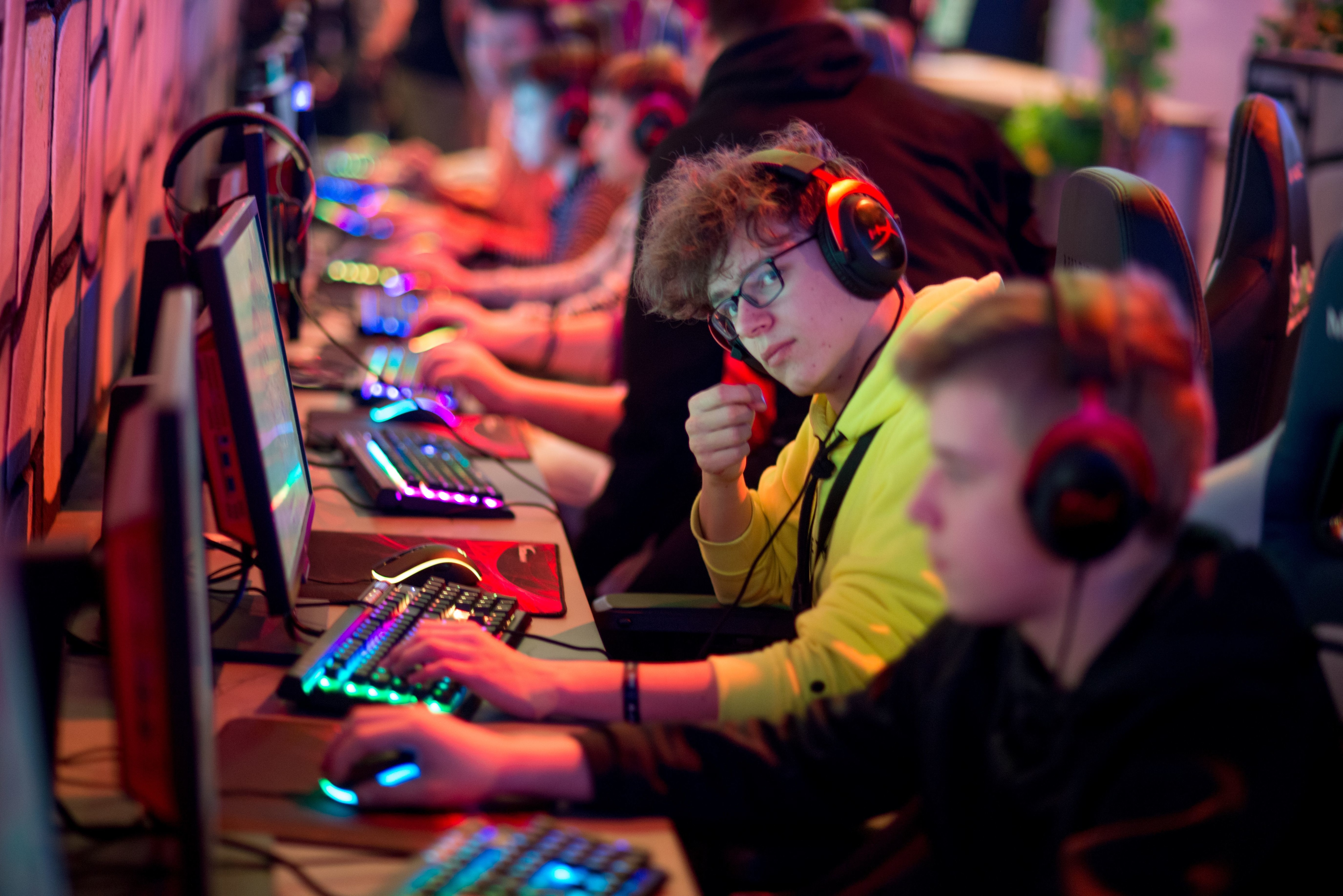Create a free profile to get unlimited access to exclusive videos, sweepstakes, and more!
Nerdy Jobs: Digital camera crews capture esports' biggest moments

When more than a million viewers tune in to the Intel Extreme Masters Katowice Counter-Strike: Global Offensive tournament, with around 10,000 more watching live in the Spodek Arena, the pressure is on — and not just for the esports athletes. Backstage, a small team is working hard to make sure that those hundreds of thousands of viewers are seeing every moment. If the observing team, which is essentially a crew of virtual camera operators, miss a crucial moment of gameplay, the consequences can be dire.
When Nicolai "dev1ce" Reedtz manages to take down two opponents in the grand final with one bullet from his AWP before swiftly taking down the final player to win the round almost single-handedly, the crowd's reaction is strangely muted for a play of this caliber. His first shot wasn't shown on the big screens or the stream for those watching back home.
"If nothing shows on screen, [the crowd] can't really cheer for anything and that sucks. We're on no delay, everything's live, so we have to make sure the right person is on screen," explains David "prius" Kuntz, a member of the observing team responsible for showing the first person viewpoints of all the players in the match. "This is the Major, where everything matters, so I definitely feel more pressure observing here because they have so many people in the crowd relying on me, making sure I bring the action."
The observer team quickly replays the epic shot missed shot after the round is over, and from Reedtz's point of view, it's clear just how impressive his play was. The crowd reacts once again and all is well, although fans (and players) are happier when key moments like this are captured live, during the high-stakes heat of the action.
"[Having a delay] takes a lot of fun out of it, and I never want to have a delay," Kuntz tells SYFY WIRE. "I always want to make sure I'm live because I do mess up, and I think it's good that I mess up sometimes because that means you know it's real and doesn't become predictable."
It's a delicate balance, as while live broadcasts run the risk of missing important parts of the action, broadcasting the whole match on a delay makes things too predictable. A few years back, esports production company PGL developed a system for CS:GO observing that put the observer on a slight delay. This meant they could see the kills happen, and then quickly switch to the person who got the kill, to give the broadcast the best view of the fight. However, CS:GO developers at Valve nixed the idea, as it ruined the suspense. Whenever an observer switched to a player who was about to enter a fight, it was a giveaway about who would win.
Almost every major esports broadcast will feature some kind of observer, silently working behind the scenes to make sure that viewers get to see the most important and entertaining moments in the game. Usually armed with just a standard keyboard and mouse the observers will sit and watch the game, trying to predict where the action is going to take place next and positioning the in-game camera to show it as clearly as possible. A lot of it comes down to game knowledge and gut instincts of where the next fight is going to break out.
However, no two esports are the same, and that means observing practices change significantly. Rainbow Six Siege may seem like a very similar game to CS:GO, as two teams of five players fight in first person views to attack or defend a bomb site, but observing them is very different. While Kuntz had a small team helping him control the in-game camera options at the Intel Extreme Masters, Kuntz, observer Marcin "Marciu" Prusinowski was all alone at the Rainbow Six Invitational.
"I control every single camera in the game, so whatever people see on the screens, I control that," Prusinowski tells SYFY WIRE as he prepares for a long day of observing.
"It's extremely difficult because people expect miracles from me. I try to do that and provide them miracles, because everyone wants to see the most important part of the game, the action, the preparation phase, strategy points," Prusinowski continues. "The predictions is the important part, and, without knowledge, I can't predict anything. So, I must spend a lot of hours playing Rainbow Six Siege, and have knowledge about the teams, like who plays the entry fragger role, for example, to show him on the screens when he goes in."
Observing looks different still at in Berlin, where Riot Games observers the LEC, the top League of Legends competition in the region. Unlike both CS:GO and RB6, League of Legends broadcasts don't show any direct player perspectives. Instead, a virtual camera flying above the map tries to show the most important actions all players are performing at that moment. Think of it as a bird's eye view like you've seen in a televised football game.
Despite there being fewer viewpoints to switch between in League of Legends, a team of three observers works every LEC broadcast. One is responsible for the main camera feed, moving it around the map to show what players are doing and any fights that may break out. Another is responsible for picking up anything the main observer may have missed, which can be replayed later, or getting different angles of fights for replays. The third works with the on-screen analyst desk to preview and analyze every match. Sometimes the desk will want to see specific things to be able to talk about it once the match is over, so they have a dedicated observer.
At the LEC the observers also have many other things to deal with. Every observer across all games will usually be able to hear the casters' audio, so they can make sure to focus the camera on what they may be talking about, but at Riot, observers can sometimes have up to 10 people in their ear at once.
"It would be very overwhelming for a single person to try and capture everything in an enchanting way," says Daniel Fontos, the lead observer at Riot Games. "You need to be aware of the live gamestate at all times, whilst juggling up to 10 voices on your comms panel, whilst also making sure your framing is correct. It can get tough in high-intensity situations"
Having to deal with all these voices, especially those of the casters, makes observing even more difficult. If the casters — the announcers — start talking about a specific player or location on the map, then it is going to look a bit strange if that player or area isn't being shown on stream. But, blindly training the camera on whatever they're talking about can cause problems too.
"I came up with this term called caster-baiting, and it's when I'm observing a player that's gonna do something and the casters go 'look at this player.' So, I switch to that player they mention and then I miss what happened on the player I was observing," says Kuntz. "It's rare, but it happens."
Observing is not an easy job, and the pressure observers are under at major events is extreme. If they mess up then millions of people could miss the action they have tuned in to see, and that could be disastrous for the event. It's also often a thankless task, many viewers wouldn't even consider that someone has to control the virtual cameras in order for them to see what is going on, and for those that do know about the role often the only time they think about it is when there's an issue or something is missed.
However, it can be extremely rewarding. Not only are observers responsible for broadcasting to millions, but they also get to travel the world attending all the different LAN events and watch esports professionally. Then, there are moments where the community rallies behind these unsung heroes of esports, and that just makes everything even sweeter.
David "prius" Kuntz recalls one instance, the Cologne Major in 2016, when subcontractors took over to observe the finals after he and another observer had handled the group stages. These subcontractors did a bad job, sparking several Reddit threads praising Kuntz and his partner.
"'Can we get prius and sapphire back? Can we please get them back, they're the best,'" Kuntz remembers reading. "Then, at the end of the tournament, it was just like, 'prius and sapphire are now worth their weight in gold.' I was just like... wow."

























